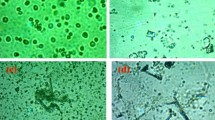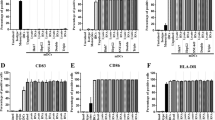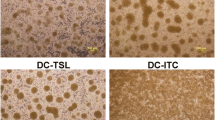Abstract
Objective
To investigate whether human dendritic cells (DC) derived from peripheral blood mononuclear cells (PBMC), which were pulsed by heat shock protein 70 (HSP70) isolated from human bladder tumor cell lines of EJ, were able to induce peptide specific cytotoxic T-lymphocytes (CTL) response in vitro and give the experimental foundation for the future clinical trials of immunotherapy in bladder tumor.
Methods
The EJ-derived HSP70 co-cultured with DC from the healthy volunteers’ PBMC, along with the crude lysate (the supernatant before HSP70 purification) from EJ cells were used as the experimental groups and DC not pulsed by any tumor cells antigen were the blank control. The autologous T-lymphocytes were added into the above various DC groups, and after incubation, the stimulation indexes (SI) and interferon-γ (IFN-γ) were detected to evaluate the immune activities of various DC groups. The killing effects of CTL to target cells, EJ and Hela cells, were determined with 51Cr releasing test.
Results
Both DC/HSP70 and DC/the crude lysate could effectively activate CTL in vitro and kill target cells EJ. The killing effect of DC/HSP70 to EJ was much stronger than DC/the crude lysate (the supernatant before HSP70 purification) (P < 0.05). DC without any tumor cell antigens had a lower killing power to EJ. Meanwhile, DC/HSP70 had little killing power to Hela non-relevant to bladder tumor histopathologically as compared with EJ cells (P < 0.05).
Conclusion
The DC pulsed by HSP70 derived from the autologous tumor cells could induce a peptide complexes specific CTL response to tumor cells, and the CTL response induced by the DC/HSP70 was stronger, which display the basis of the possible clinical application of DC/HSP70 for bladder tumor.
Similar content being viewed by others
References
Landis SH, Murray T, Bolden S, et al. Cancer statistics, 1998. CA Cancer J Clin, 1998, 48: 6–29.
Otto T, Bex A, Schmidt U, et al. Improved prognosis assessment for patients with bladder carcinoma. Am J Pathol, 1997, 150: 1919–1923.
Zeng Y, Feng H, Graner MW, et al. Tumor-derived, chaperon-rich cell lysate activates dendritic cells and elicits potent antitumor immunity. Blood, 2003, 101: 4485–4491.
Hartl FU. Molecular chaperones in cellular protein folding. Nature, 1996, 381: 571–579.
Vargas-Roig LM, Gago FE, Tello O, et al. Heat shock protein expression and drug resistance in breast cancer patients treated with induction chemotherapy. Int J Cancer, 1998, 79: 468–475.
Moroi Y, Mayhew M, Trcka J, et al. Induction of cellular immunity by immunization with novel hybrid peptides complexed to heat shock protein 70. Proc Natl Acad Sci USA, 2000, 97: 3485–3490.
Kammerer R, Stober D, Riedl P, et al. Noncovalent association with stress protein facilitates cross-priming of CD8+ T cells to tumor cell antigens by dendritic cells. J Immunol, 2002, 168: 108–117.
Peng P, Ménoret A, Srivastava PK. Purification of immunogenic heat shock protein 70-peptide complexes by ADP-affinity chromatography. J Immunol Methods, 1997, 204: 13–21.
Lin YH, Chiu JH, Tung HH, et al. Preconditioning somatothermal stimulation on right seventh intercostal nerve territory increases hepatic heat shock protein 70 and protects the liver from ischemia-reperfusion injury in rats. J Surg Res, 2001, 99: 328–334.
Cao X, Zhang W, Wan T, et al. Molecular cloning and characterization of a novel CXC chemokine macrophage inflammatory protein-2 gamma chemoattractant for human neutrophils and dendritic cells. J Immunol, 2000, 165: 2588–2595.
Bullens DM, Rafiq K, Charitidou L, et al. Effects of co-stimulation by CD58 on human T cell cytokine production: a selective cytokine pattern with induction of high IL-10 production. Int Immunol, 2001, 13: 181–191.
Ciupitu AM, Petersson M, O’Donnell CL, et al. Immunization with a lymphocytic choriomeningitis virus peptide mixed with heat shock protein 70 results in protective antiviral immunity and specific cytotoxic T lymphocytes. J Exp Med, 1998, 187: 685–691.
Becker T, Hartl FU, Wieland F. CD40, an extracellular receptor for binding and uptake of Hsp70-peptide complexes. J Cell Biol, 2002, 158: 1277–1285.
He LF, Guan KP, Ye HY, et al. Heat shock protein 70 expression in relation to apoptosis in primary bladder transitional cell carcinoma. Chin Med J, 2005, 118: 2093–2096.
Massa C, Guiducci C, Arioli I, et al. Enhanced efficacy of tumor cell vaccines transfected with secretable hsp70. Cancer Res, 2004, 64: 1502–1508.
Binder RJ, Harris ML, Ménoret A, et al. Saturation, competition, and specificity in interaction of heat shock proteins (hsp) gp96, hsp90, and hsp70 with CD11b+ cells. J Immunol, 2000, 165: 2582–2587.
Author information
Authors and Affiliations
Corresponding author
Additional information
Supported by a grant from the National Natural Science Foundation of China (No. 3000754).
Rights and permissions
About this article
Cite this article
He, L., Wang, J., Wang, X. et al. Cytotoxic T-lymphocytes response in vitro activated by dendritic cells pulsed with heat shock protein 70 derived from human bladder tumor cell lines of EJ. Chin. -Ger. J. Clin. Oncol. 7, 713–718 (2008). https://doi.org/10.1007/s10330-008-0111-2
Received:
Revised:
Accepted:
Published:
Issue Date:
DOI: https://doi.org/10.1007/s10330-008-0111-2




